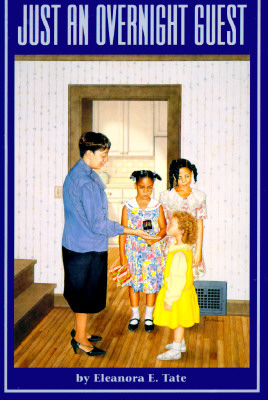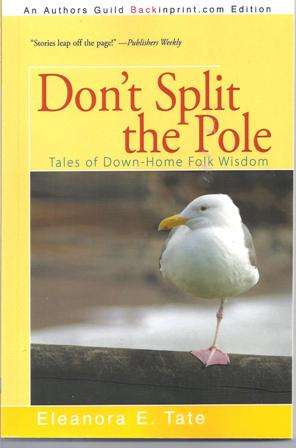©2014 By Eleanora E. Tate

After Dial Press published my first book, Just an Overnight Guest, in 1980, I naively assumed that it would be in print forever. After all, Phoenix Films adapted it into a television film in 1983 and it aired on Nickelodeon and PBS’s Wonderworks all over the country. I don’t remember which year the hardcover went out of print, but it did, and without even going into paperback!
Since that time, eleven of my manuscripts have become published books, thanks to Dial, Bantam Books, Random House, Delacorte, Franklin Watts, Pleasant Company, Just Us Books, and others. Of the eleven, Just an Overnight Guest, A Blessing in Disguise, Front Porch Stories at the One-Room School, The Minstrel’s Melody, and Don’t Split the Pole: Tales of Down-Home Folk Wisdom went out of print. The books that went out of print quickest were A Blessing in Disguise and Don’t Split the Pole, though at least they made it into paperback before being kicked to the OOP curb.
Hundreds — probably thousands — of books go belly up every year. That’s part of “the writing life.” But when it happens to your baby, it’s a shock. I’ve heard that some writers take to their beds after suffering such catastrophes. I didn’t do that, but I’m sure that I sulked and fussed to myself for days.
Oh, Eleanora, “don’t you weep, don’t you moan”! Almost as quickly as my books went out of print, Just Us Books, the premiere publisher of books about children of color (but to be read by everybody), came to their rescue. It reprinted Just an Overnight Guest (1997), A Blessing in Disguise (1999), and Front Porch Stories at the One-Room School (2007).
Thank you, Just Us Book Publishers Cheryl and Wade Hudson!
The Minstrel’s Melody, published in 2001 by Pleasant Company in its American Girl History Mysteries series, was printed next by Windmill Press in its Mysteries Through Time series (2009), and is now also available through Open Road Integrated Media as a Mysteries Through History series e-book!
 Don’t Split the Pole: Tales of Down-Home Folk Wisdom (Delacorte 1997) was brought back to life by iUniverse.com in May 2014 as part of the Authors Guild Backinprint.com edition. I’ve been a member of the Authors Guild since 2003 but wasn’t aware that this service was available to its members! Thanks, Liza Ketchum, Hamline University faculty chum, for telling me about it.
Don’t Split the Pole: Tales of Down-Home Folk Wisdom (Delacorte 1997) was brought back to life by iUniverse.com in May 2014 as part of the Authors Guild Backinprint.com edition. I’ve been a member of the Authors Guild since 2003 but wasn’t aware that this service was available to its members! Thanks, Liza Ketchum, Hamline University faculty chum, for telling me about it.
In this collection I wrapped stories around impactful sayings I’d heard over the years. The stories/sayings are: You Can’t Teach an Old Dog New Tricks; Slow and Steady Wins the Race; A Hard Head Makes a Soft Behind; Never Leave Your Pocketbook on the Floor; Don’t Split the Pole; Big Things Come in Small Packages; and What Goes around Comes Around. These sayings can probably be found anywhere in the world. I set all but one of my stories along the North Carolina coast.
Proverbs and sayings are also known as aphorisms, mottos, Biblical expressions, similes, even rich brief anecdotes. They explain a truth or a moral, offer opinions, summarize an action or thought, or are phrases or tidbits of songs, poems or books repeated so often that they enter the lexicon. Every culture throughout the world has them. A proverb or saying can be applied to many dissimilar events, depending on how different people interpret it.
I hope to target teachers who work with middle-school and high school readers; writers who seek short story writing techniques; and folklorists, storytellers, and, of course, readers of all ages.
Although many sayings go back to the beginnings of language, I place the ones I use in contemporary settings to show young readers that they still have meaning in today’s world. One of my new favorites is today’s very real “It is what it is.”
If you want to reprint one of your OOP books think about these Tate Tips:
- Make sure that you, the author, have a reversion of rights letter from the publisher who published it. In fact, when you find out that your book has gone out of print, immediately contact your publisher (or your agent) and request a reversion of rights letter from the publisher. This will speed things up when or if you decide to take that reprint step, especially if your original publisher was a “traditional” publisher like Random House, etc.
- After you find a publisher interested in reprinting your old book (good luck!), insist on getting a contract from that publisher spelling out all details, including royalty rates, any revisions that the publisher — or you — desire, publication schedules, etc. It’ll probably be a “boilerplate” contract, with the benefits leaning toward the publisher, but that’s not new.
- If you don’t recognize a word or phrase in the contract ask. Never sign anything that you don’t understand or don’t agree with. In light of today’s changing publishing world, words like all rights, now and forever, known and unknown, electronic rights, and digital rights may have meanings different from what you know. Here’s where an agent can be invaluable, but if you don’t have one, or he/she doesn’t want to be bothered, do your homework and educate yourself. Writers groups like the Authors Guild, Society of Children’s Book Writers and Illustrators, the North Carolina Writers Network, and others might be your saviors.
- Suppose you DO plan to pay a company to reprint your manuscript. That’s fine, as long as you understand what you’re paying for, and what your and the company’s responsibilities are, including marketing, publicity, distribution, and payments. I met a woman the other day who said she signed such a contract, but didn’t know how or if she’d get royalties, didn’t have someone to edit her manuscript, and didn’t have NO money to pay the company. Don’t be like that woman!
- Market your book aggressively. Send out news releases, have blog tours, visit bookstores, make book trailers, and so on, or be willing to pay to have a professional or the company do this for you. Except for the big-name writing stars, most writers these days are expected to do more marketing.
- Be aware that certain computer software programs that some publishers may require you to use to format your manuscript – from pdfs to “jumpshare” file sharing, digital signatures, and more complex stuff — might drive you up the wall if you don’t know how to implement them.
No matter how you choose to reprint your book, remember that good writing is still good writing. Rewrite any part that’s weak. Find the best editor (or professional friend) who’ll help you with spelling, punctuation, paragraphing, overall revision, chocolate cake, and wholehearted encouragement.
And now I can give a sigh of relief that all of my books are back in print. Or they were as of this morning. Happy Reading!

All good advice, especially the bit about ASKING about contracts and rights! Thank you!
Great advice! Thank you for this post about reviving out of print books.
Definitely get your rights. However, you do not need to pay to have it republished. Check out http://www.createspace.com. It’s a division of Amazon. I’ve published several books with them and never paid a penny except for copies that I purchase. You can pay them to edit and such, but it is not required. I’ve always used local proofers who work for copies because they want to support my writing. They are marketed worldwide and now that I’m using Expanded Distribution, Ingram and Taylor and other big wholesalers and retailers can purchase them at discounts. http://www.sherimcguinn.com.
I recommend setting up as a publisher at Bowker so you can purchase your own ISBNs, though – so you KEEP control of your books. With the number of books you have, it won’t cost much per book and that control is SO nice. My publishing company (publishing only my books so far) is http://www.durarepublishing.com.
(The books are marketed worldwide, not the proofers.)
Many thanks for your review, very interesting and useful article on Author’s Journey.